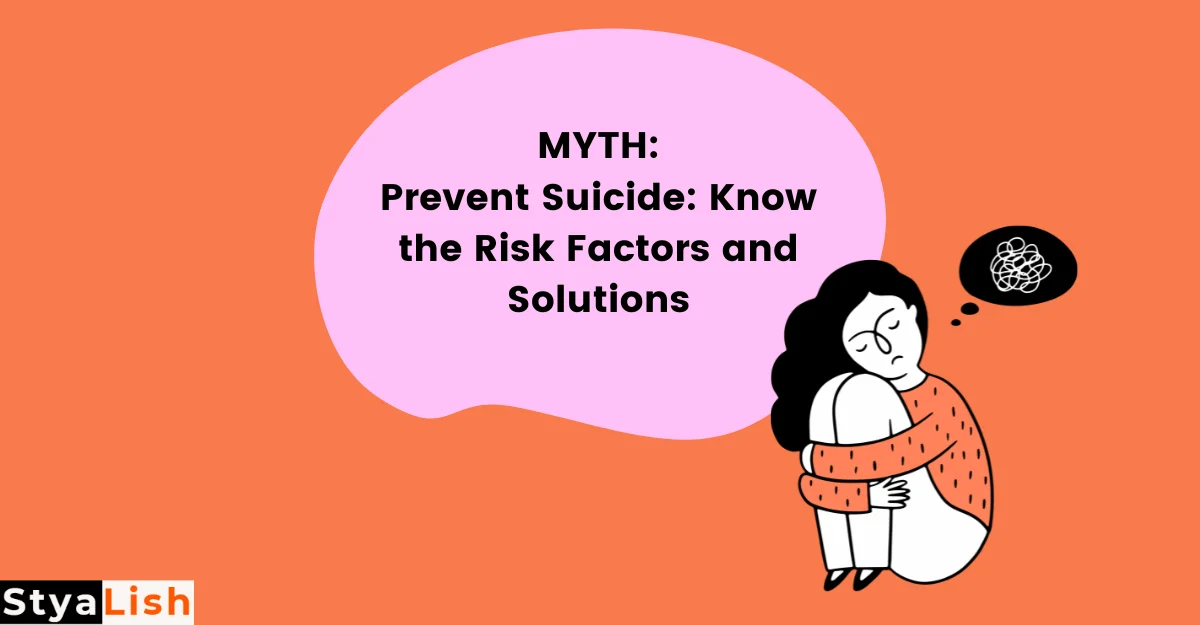Over the past half-century, the number of suicides in India has steadily increased. India reported the most significant number of suicides worldwide in 2021, a 7.2% rise from the previous year. The percentage of global suicide deaths attributable to India rose from 25.3% to 36.6% among women between 1990 and 2016. It was from 18.7% to 24.6% among men over the same period. This blog focuses on ways to prevent suicide.
Suicide was the leading cause of mortality for people aged 15–29 and 15–39 in 2016. The suicide rate in India rose from 7.9 per 100,000 in 1987 to 10.3 in 2007. The increase was most pronounced in the southern and eastern states. The largest group affected by suicide in 2021 was daily wage earners, with 42,004 deaths.
It is essential to consider how to prevent suicide.
Prevent Suicide: Know the risk factors

The impacts of suicide on individuals, their loved ones, and their communities are far-reaching and debilitating. One piece of good news is that suicide can be avoided. Suicide prevention efforts need to take place on all societal levels.
This encompasses measures taken at the societal, familial, and individual levels to avert harm. Everyone may do their part to stop suicide by becoming aware of the risks, spreading the word about how to stay safe, and building up one another’s strength.
Mental illnesses, especially depression and alcohol use disorders, are associated with suicide, and the most significant risk factor for suicide is a prior suicide attempt. Factors that increase the probability of suicide ideation, crack, or fatality is called “risk factors.” There is an imminent risk of suicide, indicated by the warning symptoms.
Biological, psychological, familial, social, and cultural elements can all serve as risk factors since they are precursors to and correlates of adverse consequences. Protective variables either decrease the chance of negative outcomes or mitigate the effect of risk factors. Therefore, it is essential to consider the ways to prevent suicide.
Some important Risk Factors are as follows:
- Attempts at suicide in the past (s)
- The presence of a family suicide history
- Using drugs improperly
- Disorders of Mood (depression, bipolar disorder)
- Possession of lethal force (e.g., keeping firearms in the home)
- Destruction and other calamities (for example, the breakup of a relationship or a death, academic failures, legal difficulties, financial difficulties, bullying)
- Previous experience with trauma or abuse
- Chronic pain and other persistent bodily symptoms
- One risk factor for suicidal ideation is among people who have recently attempted suicide.
What are the warning signs? Prevent Suicide

Some critical warning signs of suicide are as follows:
- Constantly broaching the subjects of suicide, dying, and death in one’s work or speech
- Affirming one’s feelings of hopelessness, helplessness, or worthlessness
- Abuse of alcohol and drugs has increased
- Isolation from social contacts
- Recklessness, lack of consideration, or increased risk-taking
- Shocking shifts in emotion
These warning signs can be used as indicators of preventing suicide.
How can I prevent suicide?
You are not alone in the suffering you are going through at the moment. Many of us have considered ending it all by killing ourselves at some point. Having suicidal thoughts does not make you weak, crazy, or mentally ill.
It signifies nothing good if you’re in more agony than you can handle. But you can get through this. The suffering and thoughts of suicide are temporary. Many of us have considered ending our lives when hopeless and overwhelmed by despair.
Depression is painful but can be managed, and renewed hope can be found. It’s important to remember that no matter how bad things get, there are always people who need you, communities where you can make a difference, and adventures that will show you why you shouldn’t give up.
Real bravery must stare death in the face and turn back from the precipice. If you have the guts to face the world, you can learn the tools to beat despair and find the fortitude to keep going. It is essential to prevent suicide at all costs.
Some essential steps to prevent suicide if you are getting thoughts of suicide are as follows:
First, make a promise to delay taking any action

It’s essential to allow oneself some time and space between painful thoughts and actions. Tell yourself, “I will wait 24 hours and not do anything radical in that period.” Remember that suicidal ideas and taking action are two entirely different things.
No one will force you to decide how to go right this second. Wait. Don’t immediately act on those suicide impulses. Give yourself some time, as it will help prevent suicide.
Stay away from alcoholic and narcotic beverages

Taking drugs or alcohol can heighten suicidal ideation. If you are hopeless or have suicidal thoughts, you should avoid using alcohol or medicines that you can get over the counter. This can be considered the best way to prevent suicide.
You should ensure the security of your dwelling

Take away any medicines, knives, razors, or guns that could be used for harming oneself. If that’s impossible, find a place to relax and be at ease. If you are contemplating suicide by overdose, you should provide your medications to someone who will give them back to you daily. This will help you to prevent suicide.
How can I help a loved one?
If someone tells you they are having suicidal thoughts, listening and taking them seriously is essential to prevent suicide. You should not be shy about asking them questions about their plans. Express your concern and reassurance that they are not alone. Tell them to go to a doctor or therapist right away. Do not abandon them.
And you can check the 15 self-motivation books.
- Ensure their security at all costs. For example, eliminate or restrict access to potentially harmful resources.
- Accompany them to the event. Pay close attention and validate their feelings.
- You should facilitate communication between them.
- Keep in touch. After a crisis has passed, it’s essential to follow up and keep in touch.




